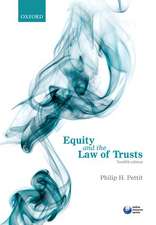Conscience, Equity and the Court of Chancery in Early Modern England
Autor Dennis R. Klincken Limba Engleză Paperback – 14 oct 2024
| Toate formatele și edițiile | Preț | Express |
|---|---|---|
| Paperback (1) | 263.15 lei 6-8 săpt. | |
| Taylor & Francis – 14 oct 2024 | 263.15 lei 6-8 săpt. | |
| Hardback (1) | 1054.71 lei 6-8 săpt. | |
| Taylor & Francis – 15 feb 2010 | 1054.71 lei 6-8 săpt. |
Preț: 263.15 lei
Preț vechi: 313.08 lei
-16% Nou
Puncte Express: 395
Preț estimativ în valută:
50.36€ • 52.18$ • 42.03£
50.36€ • 52.18$ • 42.03£
Carte tipărită la comandă
Livrare economică 21 martie-04 aprilie
Preluare comenzi: 021 569.72.76
Specificații
ISBN-13: 9781032921983
ISBN-10: 1032921986
Pagini: 328
Dimensiuni: 156 x 234 mm
Greutate: 0.61 kg
Ediția:1
Editura: Taylor & Francis
Colecția Routledge
Locul publicării:Oxford, United Kingdom
ISBN-10: 1032921986
Pagini: 328
Dimensiuni: 156 x 234 mm
Greutate: 0.61 kg
Ediția:1
Editura: Taylor & Francis
Colecția Routledge
Locul publicării:Oxford, United Kingdom
Public țintă
AcademicCuprins
Contents: Preface; Introduction; Conscience and the medieval chancery; The early 16th century and Christopher St. German; The later 16th century; Protestant conscience 1: the early 17th century; The conscience of early-17th century equity; Protestant conscience 2: the later 17th century; Later-17th century equity and Lord Nottingham; Conclusion; Bibliography; Index.
Notă biografică
Dennis R. Klinck is Professor of Law at McGill University, Canada
Recenzii
'... diligent readers can learn much from his [Klinck's] wide-ranging and penetrating analysis of shifting and alternative meanings of conscience in legal and religious texts and works of political and moral philosophy.' Journal of British Studies 'It is this breadth of perspective that sets Klinck's book apart. It will be of great interest to historians of law, religion, theology, philosophy, and culture, because it provides a fresh and thoughtful perspective on a perennially difficult issue: understanding how one of the most important operative concepts in the Christian society of medieval and early-modern England was assumed, understood, and applied in a judicial manner.' Law and History Review 'Readers in legal history will welcome the author's clarity of thought; literary historians will profit from his reasoned examination of relevant texts.' Renaissance Quarterly ’As a work of substantive legal history, this work excels in many areas. But what is in it for the generalists? Plenty. ...Those interested in legal history, contemporary legal scholars, and political historians will find this work most interesting, and generalists at the graduate level will find this work rewarding.’ Sixteenth Century Journal 'In his rich study Professor Klinck considers whether the shift [in the restriction of the potential claims of Chancery] might have been related to changing concepts of conscience as understood by divines writing or preaching on ethical theory and moral casuistry. Two of his chapters, Five and Seven, provide a splendid survey of these changes in the course of the seventeenth century. These are chapters that should be required reading for historians of English religion interested in the consequences of the Protestant Reformation and of the battles over ’freedom of conscience’ from the mid-century.' English Historical Review
Descriere
This study tackles the difficult yet crucial subject of the place of conscience in the development of English law, illuminating what is meant by describing the Court of Chancery as a 'court of conscience'. Addressing the notion of 'conscience' as a juristic principle in the Court of Chancery during the sixteenth and seventeenth centuries, the book








